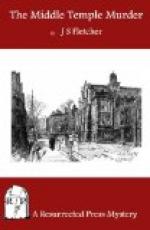“Oh, of course, we know all about it—now. As soon as we found out who he really was, we had all the particulars turned up. Aylmore, or Ainsworth (Stephen Ainsworth his name really is) was a man who ran a sort of what they call a Mutual Benefit Society in a town right away up in the North—Cloudhampton—some thirty years ago. He was nominally secretary, but it was really his own affair. It was patronized by the working classes—Cloudhampton’s a purely artisan population—and they stuck a lot of their brass, as they call it, in it. Then suddenly it came to smash, and there was nothing. He—Ainsworth, or Aylmore— pleaded that he was robbed and duped by another man, but the court didn’t believe him, and he got seven years. Plain story you see, Spargo, when it all comes out, eh?”
“All stories are quite plain—when they come out,” observed Spargo. “And he kept silence now, I suppose, because he didn’t want his daughters to know about his past?”
“Just so,” agreed Rathbury. “And I don’t know that I blame him. He thought, of course, that he’d go scot-free over this Marbury affair. But he made his mistake in the initial stages, my boy—oh, yes!”
Spargo got up from his desk and walked around his room for a few minutes, Rathbury meanwhile finding and lighting another cigar. At last Spargo came back and clapped a hand on the detective’s shoulder.
“Look here, Rathbury!” he said. “It’s very evident that you’re now going on the lines that Aylmore did murder Marbury. Eh?”
Rathbury looked up. His face showed astonishment.
“After evidence like that!” he exclaimed. “Why, of course. There’s the motive, my son, the motive!”
Spargo laughed.
“Rathbury!” he said. “Aylmore no more murdered Marbury than you did!”
The detective got up and put on his hat.
“Oh!” he said. “Perhaps you know who did, then?”
“I shall know in a few days,” answered Spargo.
Rathbury stared wonderingly at him. Then he suddenly walked to the door. “Good-night!” he said gruffly.
“Good-night, Rathbury,” replied Spargo and sat down at his desk.
But that night Spargo wrote nothing for the Watchman. All he wrote was a short telegram addressed to Aylmore’s daughters. There were only three words on it—Have no fear.
CHAPTER TWENTY-NINE
THE CLOSED DOORS
Alone of all the London morning newspapers, the Watchman appeared next day destitute of sensationalism in respect to the Middle Temple Murder. The other daily journals published more or less vivid accounts of the identification of Mr. Stephen Aylmore, M.P. for the Brookminster Division, as the ci-devant Stephen Ainsworth, ex-convict, once upon a time founder and secretary of the Hearth and Home Mutual Benefit Society, the headquarters of which had been at Cloudhampton,




